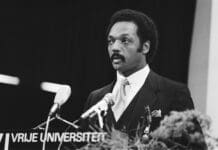Do you identify as an “evangelical,” or do you struggle with that label? What is an evangelical, exactly? This second question is one that VeggieTales creator Phil Vischer explored the question, what is an evangelical, in his latest Holy Post podcast.
“A conservative Christian? A conservative, white Christian? A conservative, white Christian who votes Republican? There’s so much confusion about the term ‘evangelical Christian,’” said Vischer, “that we need to take a little trip back in history to figure it out.”
What Is an Evangelical? A Quick Look at American History
What is an evangelical? Well, first of all, the word “evangelical” comes from the Greek word “euangelion,” which means “good news.” But it was actually not until after the Great Awakening that Americans started to describe themselves as “evangelicals.” The Great Awakening was a movement of revival during which leaders like George Whitefield and Jonathan Edwards stressed that true followers of Jesus need to actually make a decision to follow him—that is, be “born again.” A key teaching during this movement was that the Bible was divinely inspired and without error.
However, said Vischer, a new way of reading Scripture developed in Germany and arrived in the U.S. in the mid-1800s around the same time as Darwinism. This new way of interpreting the Bible from the Tübingen school saw Scripture as having errors and did not see the Bible as divinely inspired. American Christians who accepted these views became known as “modernists,” and the modernists began sending pamphlets with these teachings to churches throughout the country. Those who held a high view of Scripture responded with their own series of pamphlets called “The Fundamentals,” thus giving rise to Christians who called themselves “fundamentalists” and the result became known as the Modernist-Fundamentalist Controversy.
In the early twentieth century, politician and orator William Jennings Bryan emerged as a prominent champion of fundamentalism, defending it against both evolutionists and modernists. Bryan is famous for having participated in the 1925 Scopes Monkey Trial in Dayton, Tennessee, in which he prosecuted high school science teacher John Scopes for breaking Tennessee law by teaching evolution. The event was “bigger than the O.J. [Simpson] trial” as far as how widely publicized it was across the nation, said Vischer.
At one point during the trial, defense attorney Clarence Darrow called Bryan to the stand and cross-examined him, asking him difficult questions about the Bible with the goal of discrediting Bryan’s fundamentalist beliefs. The interchange between Darrow and Bryan ended up being a significant one in the history of American Christianity because the result was it made fundamentalist Christians look foolish on a national level.
Said Vischer, “In the end while William Jennings Bryan won the trial, fundamentalists lost the war.” Bryan was widely mocked in the media, with one writer calling him a “buffoon” and labeling all fundamentalists “morons.” It did not help matters that Bryan passed away only five days after the trial was over, leaving fundamentalists without a prominent spokesperson and defender. “Mocked and without a champion,” said Vischer, “fundamentalist Christians turned away from the larger culture to focus on building a subculture of their own.”
A year before the Scopes trial, Bryan had what turned out to be a pivotal conversation. He commented to a friend of his that if American schools continued teaching evolution, most people in the U.S. would become atheists. Bryan’s friend happened to be Bob Jones Sr., the founder of Bob Jones University in Greenville, South Carolina. The school, Jones, and his son became fundamentalism’s “most visible champions for the next 50 years,” said Vischer. Under their influence, fundamentalism became associated with more than just a high view of Scripture. It came to represent separation from the world, as well as anti-intellectualism and racial segregation. (Notably, Bob Jones University did not lift its policy banning interracial dating until the year 2000.)
What Is an Evangelical? The Rise of the Neo-Evangelicals
But some Christians did not feel comfortable in the modernist camp or the fundamentalist camp, said Vischer. They wanted an alternative that would allow them to have a high view of the Bible without embracing racial segregation or separating from the world. Prominent leaders who promoted this alternative, called “neo-evangelicalism,” included Harold Ockenga, who founded the National Association of Evangelicals in 1942, and Carl Henry who co-founded Fuller Seminary and was the founding editor of Christianity Today. When evangelist Billy Graham held a crusade at Ockenga’s church, the two men became friends, and the neo-evangelicalism gained a prominent spokesperson.
Now, said Vischer, there were now three main streams in American Christianity: modernism, fundamentalism, and neo-evangelicalism. But, he asked, “Have you ever heard anyone introduce themself as a ‘fundamentalist Christian’? No? Where did all the fundamentalists go?” The answer has to do with “the one force in America that might be more powerful than religion: politics.”
According to Vischer, fundamentalists were content to live in their own subculture until the 1960s and the appearance of Jerry Falwell Sr., a leader who checked “all the southern fundamentalist boxes.” Falwell was against evolution, political involvement, and integration, said Vischer. In fact, he started what was known at the time as “segregation academy,” that is, a school for white students whose parents were concerned about integration.














